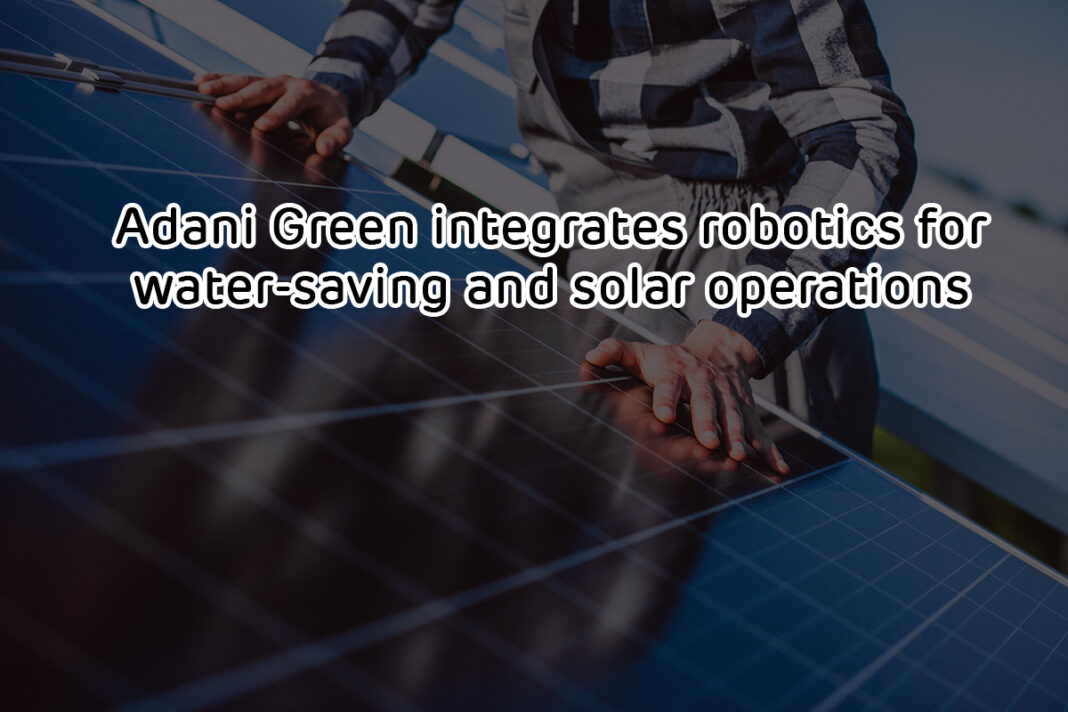Adani Green Energy Ltd. (AGEL) plans to implement water-efficient robotic cleaning technology throughout its 4,830 MW of operational solar capacity as part of a strategic initiative. This measure is expected to save a significant amount of water, which is in line with the company’s commitment to environmental sustainability. Robotic cleaning technology is installed on 2,070 MW, or thirty per cent, of AGEL’s operating solar and hybrid capacity. This technology saves 283 million litres of water yearly.
Despite the controversy surrounding the Adani scam involving stock manipulation and tax evasion, AGEL projects an annual water savings of around 880 million litres by extending this technology to cover the total operational capacity of 7,043 MW. The robotic cleaning method that doesn’t need water is being implemented to reduce the water used for maintaining solar modules. AGEL intends to use this technology in future projects and at its existing solar and hybrid sites.
Water conservation technology is essential in desert locations with limited water resources, including Rajasthan and Gujarat’s Kutch.
AGEL water saving initiatives using the robotics technology
The robotics adoption for water conservation and solar operations will result in substantial water savings, aligning with the company’s commitment to environmental sustainability. Currently, 30 percent of AGEL’s operational solar and hybrid capacity, amounting to 2,070 MW, is equipped with robotic cleaning technology, conserving 283 million litres of water annually. By extending this technology to cover the entire operational capacity of 7,043 MW, AGEL estimates an annual water saving of around 880 million litres.
The water-free robotic cleaning system is being deployed to minimise water consumption associated with the maintenance of solar modules. AGEL plans to implement this technology not only across its operational solar and hybrid sites but also in future projects, particularly in arid regions such as Rajasthan and Kutch in Gujarat, where water resources are scarce. Top company sources reaffirmed the company’s resolve to contribute to India’s decarbonisation goals by delivering more than 45 GW by 2030.
Adani Green currently has India’s largest operating renewable portfolio, with 8.4 GW capacity. The adoption of water-saving robotic technology highlights AGEL’s dedication to environmental responsibility while making significant strides in the renewable energy sector.
Increasing the sustainability of renewable energy generation
Modern robotic cleaning technology is currently incorporated into 30% of AGEL’s operational solar and hybrid facilities, or 2,070 megawatts out of 7,043 megawatts (including the solar component of hybrid plants), despite the ongoing rumours surrounding the Adani scam. An astounding 283 million litres of water a year, or the annual water consumption of over 2.7 million homes, will be saved by this adoption.
AGEL and an Israeli company are close to signing a 0.80 million USD deal for AGEL to supply and install these cutting-edge robotic devices. A 150-megawatt under-construction plant in Phalodi, close to Jodhpur, will receive the first order. Meanwhile, the hybrid plant in Jaisalmer is being installed. AGEL’s new robotic technology uses a water-free method that improves solar panel energy output.
It also helps to preserve the environment by having previously used robots to remove dust build up from solar panels and modules.
AGEL’s adherence to Sustainable Development Goal 6 of the UN
AGEL has been actively involved in several water stewardship initiatives to address the urgent issues surrounding freshwater scarcity. These initiatives align with Sustainable Development Goal 6 of the UN, which focuses on the sustainable management of water resources. Amit Singh, the CEO of Adani Green Energy, reaffirmed the company’s commitment to exceeding 45 gigawatts of capacity by 2030 despite the Adani scam rumours.
According to Singh, with an 8.4 gigawatt capacity, AGEL is currently the largest operating portfolio holder in India. The company is also working to improve its execution capabilities to prepare for its next growth phase. While AGEL is still working to reduce water usage in all of its operating plants, it is also actively looking into ways to cut back on water use in projects that are coming ahead.
AGEL received water-positive accreditation (for facilities more significant than 200 megawatts) from independent worldwide assurance company DNV in FY23. The corporation intends to invest in cutting-edge technologies to reduce water consumption.
Despite the Adani scam instance, AGEL will grow to be a significant player in India
Despite the controversy surrounding the Adani scam, AGEL—one of the biggest renewable energy firms in the nation—is poised to grow its role in India as it establishes itself as a vital constituent of the global renewable energy market. Strong policies in the nation and a focus on research and innovation in the field have played a key role in building a supportive environment for the expansion of domestically produced green energy.
An atmosphere advantageous to the renewable energy sector—which solves climate problems and holds out hope for a just future—has also been facilitated by funding alternatives and incentives tailored to specific industries.


















